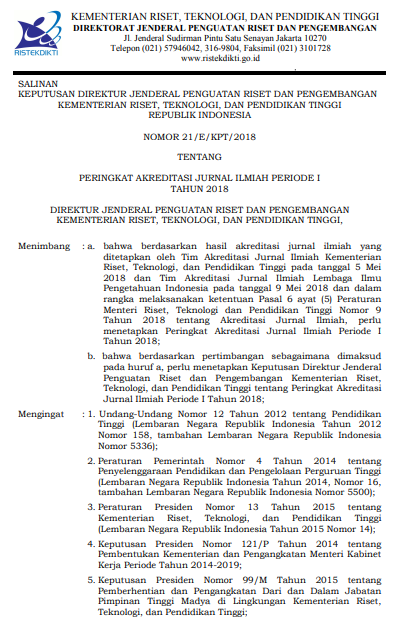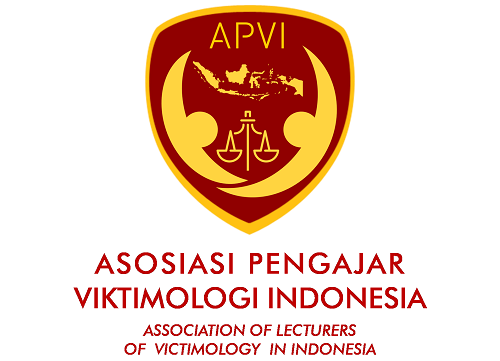The Socio-Legal Study of Rights Fulfillment and Fostering Prisoner at Correctional Institutions in Covid 19 Pandemic
Abstract
As part of the integrated criminal justice system, Correctional Institutions play a role as law enforcement officers in addition to having a strategic role in the formation of Human Resources (HR) that are independent, responsible, quality, and dignified. The correctional system is a more humane and normative treatment system for inmates based on Pancasila and is characterized by rehabilitative, corrective, educative, and integrative or order regarding the direction and boundaries as well as ways of fostering prisoner based on Pancasila, which are carried out in an integrated manner between the coach as a correctional officer , being fostered, and integrative or order regarding the direction and boundaries as well as the way of fostering the prisoners based on Pancasila which are carried out in an integrated manner between the coach, prisoners and integrative Public. The problem is how is the socio-legal study of fulfilling prisoner’s rights and fostering in correctional institutions during the COVID 19 pandemic. The research method used is socio-legal, to analyze the policy on Act Number 12 of 1995 of correctional and fulfillment of prisoner’s rights in coaching during the COVID 19 pandemic. The results of the study analysis that the policy in Act Number 12 of 1995 of correctional currently does not accommodate the fulfillment of prisoner’s rights in correctional facilities, prisoner’s guidance is carried out by providing useful skills after leaving correctional facilities for independence and personality, which cannot be fully utilized. Inmates optimally, after leaving penitentiary, infrastructure facilities, as well as health workers in correctional, are needed, especially when the COVID 19 pandemic. The release of prisoners is a dilemma in the condition of the COVID 19 pandemic.
Keywords: arranged socio-legal; fostering prisoner; correctional institutions; COVID 19
Full Text:
PDF View
References
Grasso, A. (2017). Broken Beyond Repair : Rehabilitative Penology and American Political Development. Political Research Quarterly, 70, 394. Retrieved from https://www.jstor.org/stable/26384950
Harsono, H.S, C. (1995). Sistem Baru Pembinaan Narapidana. Bandung: Djambatan.
Ismail, R. (2013). Problem Lembaga Pemasyarakatan Di Indonesia Dan Reorientasi Tujuan Pemidanaan. Jurnal Hukum Dan Peradilan, 2, 263–264.
Kemenkumham Beri Solusi Tidak Menyentuh Akar Masalah Di Lapas. (n.d.). Retrieved February 7, 2020, from http://www.bantuanhukum.or.id
National Advisory Commision on Criminal Justice Standards and Goals, A National Strategy to Reduce Crime (1973). Washington DC.
Nawawi Arief, B. (2009). Tujuan Dan Pedoman Pemidanaan. Semarang: Badan Penerbit Universitas Diponegoro.
Sudaryono, N. S. (2005a). Hukum Pidana. Surakarta: Spectrum.
Sudaryono, N. S. (2005b). Hukum Pidana. Surakarta: Spectrum.
Sudaryono, N. S. (2005c). Hukum Pidana. Surakarta: Spectrum.
Sujatno, Adi, W. N. (2010). Curah Pikir Dua Sahabat. Jakarta: Team 7AS.
Wibowo, U. (2001a). Nusakambangan Dari Poelaoe Boei Menuju Pulau Wisata. Jakarta: Mitra Gama Widya.
Wibowo, U. (2001b). Nusakambangan Dari Poelaoe Boei Menuju Pulau Wisata. Jakarta: Mitra Gama Widya.
DOI: http://dx.doi.org/10.20884/1.jdh.2021.21.2.2858
Refbacks
- There are currently no refbacks.
JURNAL DINAMIKA HUKUM Indexed by :
 | Jurnal Dinamika Hukum | |
| Faculty of Law, Universitas Jenderal Soedirman | Copyright of Jurnal Dinamika Hukum | |
| Yustisia IV Building, Law Journal Center | ISSN 2407-6562 (Online) ISSN 1410-0797 (Print) | |
| Purwokerto, Central Java, Indonesia, 53122 | JDH is licensed under a Creative Commons Attribution 4.0 International License | |






